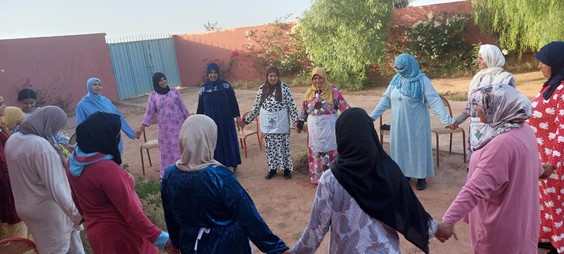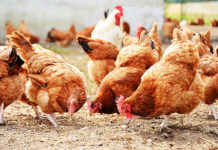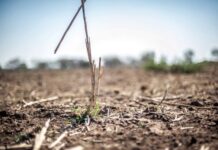A research study reveals the positive community impact of sustainable agricultural initiatives when preceded by women’s empowerment workshops, leading to participatory action, enhanced community well-being, and decentralization.
Since 2016, the High Atlas Foundation has implemented self-discovery workshops that encourage and equip women to recognize their intrinsic value, identify their goals, and strategically consider their plans for the future. The “Imagine” program takes place over four days and provides a space for pursuing personal and collective empowerment.
Imagine utilizes a rights-based approach that integrates Morocco’s Family Code – Moudawana – and facilitates women’s exploration of their legal protections. Cooperative-building activities also enable women to increase their financial independence and access to equitable development.
The High Atlas Foundation recently conducted a comparative impact analysis with two groups of women in the Toubkal rural municipality of the Taroudant province following two climate actions. In 2017, HAF hosted an Imagine empowerment and development experience with women in the Aguerzrane village. During the experience, the participants examined social relationships in their lives that influence their ability to advance their goals. Throughout the workshop, participants further considered their outlook on work and money, emotions and body, sexuality and spirituality (in a Moroccan-Islamic context), and their vision for the future.
After the participatory planning experience, the Aguerzrane women decided to build an organic fruit tree and medicinal herb nursery. This method of cultivation, the women realized, would generate income through plant sales in their region as well as contribute to the existing household needs of the community. The nursery was built in 2018 on newly constructed agricultural terraces built on formerly eroding mountainsides, and the nursery has been productively operating ever since. The provision of regular technical training has been provided by highly qualified volunteers through the USAID Farmer-to-Farmer Program.
The second village, Missour, is one kilometer north of Aguerzrane. In 2018, HAF received a request from their farmers for cherry, walnut, and almond trees, and HAF met the request. The Imagine workshop and participatory methods were not facilitated in this community, but the farmers received, planted, and maintained the trees based on the quantity and variety they preferred.
HAF then assisted a graduate thesis study that examined the social and economic effect on both villages: Aguerzane, which participated in the women’s empowerment workshop prior to receiving seeds and materials; and Missour, where trees were provided without inclusive participatory planning. The researcher, Nora Martetschläger, spent three months living with the communities, engaging in individual and communal data gathering procedures to analyze multidimensional poverty.
In her published summary of the analysis, Nora found that “although the other village [Aguerzane], where fewer trees were planted, performed worse overall on most poverty indicators, women’s participation in education and employment was higher because of more individual and collective awareness and action in those areas.”
In Missour, however, there was a negligible income benefit for the women despite reported increases in household earnings and food security. There was no increase in girls’ participation in education or women’s literacy. However, two families moved to the city – likely partially enabled by the new income – where there are more opportunities for girls’ participation in education.
This study illuminates a significant challenge in the connection between women’s empowerment and scalable climate action for inclusive systemic change and national resilience. HAF’s women’s empowerment workshops have proven to be an effective strategy for improving cross-sectoral sustainable development. However, the demand for such strategies is limited by organizational capacity. Upon reviewing Nora’s study, HAF took remedial action in Missour by facilitating Imagine workshops. Funds from the Darden School of the University of Virginia will be used to build agricultural terraces on an eroding mountainside the Missour community designated for the women’s group.
However, the limiting issue of capacity remains: HAF has 15 empowerment trainers and anticipates planting a minimum of 1.7 million trees with 10,000 farming families in 160 municipalities this year. These objectives are indicative of a broader structural challenge to the implementation of strategic, community designed solutions. HAF lacks the finances and personnel to implement and monitor climate-smart agriculture to ensure that women and girls are the direct beneficiaries, despite having a strategy to achieve national scale.
This study also reveals the potential challenges to implementing decentralization without first solidifying participatory experiences at the local level. The enhanced subnational power afforded by decentralization will entrench existing class and gender based stratifications in subnational jurisdictions. Climate-smart agricultural projects could have the same effect of affirming inequitable power and resource distribution if such projects are not founded on participatory experiences. Women’s and girls’ participation and management in all phases of development must be front and center in order for climate actions to positively impact their lives, families, communities, and country.
Dr. Yossef Ben-Meir is President of the High Atlas Foundation and a Visiting Professor of the University of Virginia








